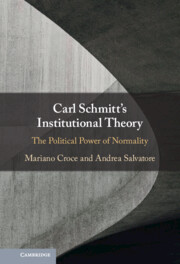Book contents
- Carl Schmitt’s Institutional Theory
- Carl Schmitt’s Institutional Theory
- Copyright page
- Contents
- Acknowledgements
- Introduction
- 1 What Is Exceptionalist Decisionism?
- 2 Looking Backwards
- 3 How Exceptionalist Decisionism Came About
- 4 A Fresh Start
- 5 Out of the Exceptionalist Quagmire
- 6 The Politics of Normality
- 7 Doing Away with Politics
- Conclusion
- References
- Index
1 - What Is Exceptionalist Decisionism?
Reinterpreting Political Theology
Published online by Cambridge University Press: 23 June 2022
- Carl Schmitt’s Institutional Theory
- Carl Schmitt’s Institutional Theory
- Copyright page
- Contents
- Acknowledgements
- Introduction
- 1 What Is Exceptionalist Decisionism?
- 2 Looking Backwards
- 3 How Exceptionalist Decisionism Came About
- 4 A Fresh Start
- 5 Out of the Exceptionalist Quagmire
- 6 The Politics of Normality
- 7 Doing Away with Politics
- Conclusion
- References
- Index
Summary
Chapter 1 offers an unconventional reading of Schmitt’s emblematic work Political Theology (1922) – one that can be dubbed ‘jurisprudential’. Contrary to prevailing interpretative frames, the jurisprudential reading has it that in Political Theology the political, foundational problem of where the political order comes from was of minor interest to Schmitt. Rather, he concerned himself with the vexed jurisprudential question of what allows describing a set of different norms and procedures as a uniform legal order. In this light, Political Theology should be regarded as an inquiry into the identity and the unity of the legal order in the first place. The chapter goes on to argue that Schmitt’s mobilising theology and theological concepts were instrumental in vindicating his answer to this jurisprudential question. This argument will be propaedeutic to a far-reaching revision of Schmitt’s theory as an investigation into how the law ensures the stability of social life. If this reading holds true, then the role of Political Theology in Schmitt’s overall production should be largely scaled down.
- Type
- Chapter
- Information
- Carl Schmitt's Institutional TheoryThe Political Power of Normality, pp. 8 - 26Publisher: Cambridge University PressPrint publication year: 2022



